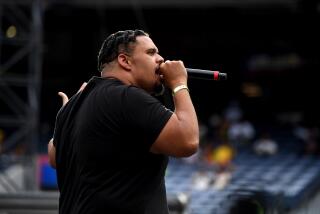Album review: Living large on ‘God Forgives, I Don’t’
Rick Ross
“God Forgives, I Don’t” (Maybach Music Group/Def Jam)
Three stars (out of four)
Speaking recently to MTV, Rick Ross revealed the inspiration for “Diced Pineapples,” a track from his new studio album, “God Forgives, I Don’t.” Last year, the portly, bearded Miami rapper suffered two seizures while attempting to fly to Memphis, Tenn., for a concert, and when he was leaving the hospital, Ross recalled, “the doctor told me, ‘You gotta eat some more fruit, drink you some water … and just relax for a little while.’”
Sound advice for the average Joe, no doubt. But for hip-hop’s most fabulous fabulist — a former Dade County corrections officer who now portrays himself as an untouchable drug lord — the doctor’s orders seem like risky business. Living larger than any of his peers — and rhyming about it with little to no acknowledgment of its basis in fantasy — is precisely what’s enabled Ross to effect his unlikely transformation; he’s succeeded by becoming too big to fail. Austerity measures would only weaken the bravado at the core of his act.
Happily, Ross declines to downsize on “God Forgives, I Don’t,” which arrives following a lengthy delay, presumably attributable to the rapper’s health troubles. The new disc extends an over-the-top hot streak that began with 2009’s “Deeper Than Rap” and includes “Teflon Don,” from 2010; it’s rooted in the same lush production sound and name-checks just as many ultra-high-end luxury brands — even the Lear jet on which the second of his seizures struck.
“Five hundred for the car that I got on the strip / That’s another hundred, what I got on my wrist,” Ross boasts over a shimmering “Miami Vice”-style groove in “Maybach Music IV”; “Presidential,” with a sumptuous beat by Pharrell Williams, describes the pleasure of “walking on Jewish marble.”
For “3 Kings,” Ross boosts the money talk further, hosting two pals from his rarefied tax bracket: Jay-ZandDr. Dre, the latter of whom uses the opportunity to rather artlessly plug his line of pricey headphones. Jay-Z is better — or least more characteristically charming — breaking down his negotiating tactics for an upcoming contract renewal with Live Nation.
Yet despite the satisfaction Ross obviously still takes in all this — and despite how singularly good at it he remains, as in “911,” where he beseeches the Lord to let him drive his Porsche to heaven — “God Forgives, I Don’t” reflects deeper stirrings. Ross isn’t showing cracks in the facade he’s built up so assiduously over the last few years; rather, it’s an indication of his confidence in his back story that he’s now looking to what happens next, as though the first several chapters were safely beyond reproach.
In “Ashamed,” Ross grows reflective about his purported drug dealing over a dusty Wilson Pickett sample punched up by the pop-wise production duo Cool & Dre: “Maybe one day I could put this pain away,” he raps, remembering his mother’s struggle to raise a family on minimum wage, “Until then I’m-a be a D-boy, I’m ashamed to say.” He treads similar moral-ethical ground in “Hold Me Back,” a swarming goth-rap number that play-by-plays his introduction to the trade; it presents dealing as the only viable option for someone with an empty refrigerator and children to feed. “Everything went well — I’m eating steak, no more soup,” he reports after his first night on the job. “Then I parked the Capri, I went and got me a coupe.”
There are self-aware moments here too that feel new for a Rick Ross record. In the low-slung “Pirates,” he admits, “Fascination with fortune afford me mansion and Porsches,” alluding slyly to a career that’s become a kind of feedback loop. And in “Sixteen,” he and André 3000 team up for a long meditation on how a rapper’s standard 16-bar verse “ain’t enough” to depict “exactly what life means to you” — proof that Ross’ unsatisfiable appetite is hardly limited to cars or cash.
Or food. If the song “Diced Pineapples” began as a bit of prescribed meal planning, it’s become something else here: a plush encomium (with cooed chorus by Drake) for the latest lady in his life. It’s not sweet, exactly — not with the borderline-gynecological language he uses. But as Ross breathlessly enumerates the amenities she’s in for — “belt buckles” and “door handles” among them — it’s clear that far from chastening him, the rapper’s midair brush with death only intensified his hunger. On this commanding, complicated album, he wants more out of more.
ALSO:
Rock the Bells adds third stage
Nas tops Billboard charts with ‘Life Is Good’
‘Life is Good”’shows Nas rolling with the punches
More to Read
The biggest entertainment stories
Get our big stories about Hollywood, film, television, music, arts, culture and more right in your inbox as soon as they publish.
You may occasionally receive promotional content from the Los Angeles Times.











